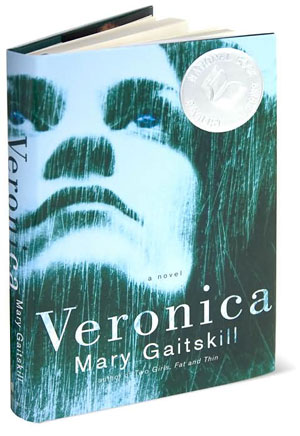
Veronica
Mary Gaitskill
Pantheon
Hardcover
240 pages
October 2005
Veronica is a sad, melancholy tale of love, sex, death, friendship, illness, and pain. Writing as though she is single-handedly redefining the genre of literary fiction in the disturbing yet exquisite Veronica, Mary Gaitskill has penned a compelling and persuasive story of a seemingly incompatible friendship in the age of AIDS.
Alyson first meets Veronica working as a temp for an ad agency in New York City. Initially finding her a little too forward, brash, and a little too hard to handle, Alyson is hesitant to befriend this slightly heavyset older woman who has difficulty making friends and is, at least to Alyson's eyes, an unmitigated fashion disaster. But a sympathetic connection forms between the two.
When Veronica confides that she has contracted HIV from Duncan, her self-confessed bisexual boyfriend, Alyson, with a mixture of pity, compassion, and perhaps even love, adopts this abrasive, prissy, uncompromising woman who doesn't know when to keep quiet,:"she has a lot of smart cracks stored up. She needed them, when she didn’t have them, she was naked and everybody saw."
But Alyson's friendship with Veronica is only part of the story. Gaitskill steadily charts Alyson's journey from her claustrophobic childhood in suburban New Jersey, complete with an uncommunicative, reserved father, a wayward, nervy mother, and two very ordinary sisters, to her time as a fashion model in the decadent Paris and Manhattan of the '80s - "the dumpy apartments full of sadomasochists, tattooed doorman in cave-like nightclubs, and strip mall bars for the beautiful club crowd."
We are first introduced to Alyson at fifty, the decadent hedonistic life of a model - the coke, the sex, the parties, and the beautiful people - a thing of the past. Now she is living a sad life full of pain; she has lost her looks and is on disability, plagued by chronic arm and neck pain. Only her best friend John is there to pity her, "a beautiful girl in a ruined face," forever broken with age and pain coming through the cracks.
It is only natural that Alyson should cling to something familiar, remembering her friendship with Veronica with a kind of whimsical regret. Veronica certainly wasn't the center of her life, but she was always there, the loyal person to fall back on. The recollection of her not only helps Alyson cope with her pain but also provides the story's central mirror image - while Alyson was carried way, "loving the rich things and the money and people kissing my *ss," Veronica's friendship ultimately provided the only solid bedrock of her life.
This novel is all about memory and the search for connection, perhaps even for love. Alyson aches for a meaningful relationship, for some kind of bond with someone. Her problem is that she's constantly looking at people in her life as objects without specific functions, circulating in a world where the physical beauty is all. She wants to know people and to love, but she has developed a "habit of distance" that has become so deep she doesn't know how to be with another person. Even when Veronica is near death's door, silently suffering, Alyson is quick to pass brittle, frail judgments upon her.
Most of the characters in Veronica are unlikable, but it is testament to Gaitskill's enormous talents as a writer that she can expose their very real human flaws yet create certain sympathies for their plight. Alyson is an utterly fascinating character; she seems to be suspended forever on an imaginary brink, eyes dimmed and looking at nothing. In Veronica, the author has created a complex women who gradually realizes that there is a senselessly "disordered world" that is "slowly being taken from her. "
The characters in Veronica are constantly living on the verge, but they also fully hold close their fates even if they are reluctant to do so, whether it is chronic pain, a life of bad luck, or even certain death from an incurable disease, or just plain sadness – "sadness brimmed; it bore up my hate like water bears ice and carried it away." Their complicated relationships and their lives in the big city are rife with distress, lonesomeness, and neglect. But for Alyson, hope is on the horizon, and you get the feeling that she'll be able to make her way in the world. The novel ends optimistically, an undeniable vestige of sanguinity in this profound work of contemporary literary fiction.
Originally published on Curled Up With A Good Book at www.curledup.com. © Michael Leonard, 2006




